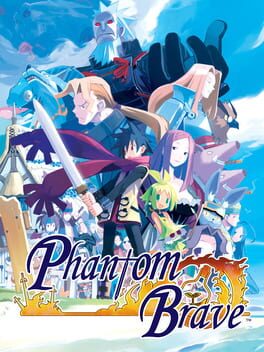Arte bonita e mecânica interessante.
O jogo é bom até o ponto que você se toca de que todas as batalhas serão desnecessariamente "complexas". Mecânicas enjoativas? Nenhum pouco, mas são mt complicadas, e isso faz com que a experiência do jogo se torne uma coisa que, além de recompensadora em alguns momentos, demanda MUITO tempo pra passar de um único estágio. Não me entendam errado, algumas batalhas são muito boas, e a mecânica geral do jogo é interessante e te prende, mas chega certos momentos em que os pontos bons do jogo viram seus defeitos. Após certo tempo você começa a perder a paciência ao ter que passar 5-15 minutos pra passar de um estágio que tem apenas 6 mobs básicos,isso sem mencionar as cenas lentas, cenas essas que seriam muito mais agradáveis se fossem caixas de texto com um desenho do personagem ao lado sem animação alguma.
Phantom Brave é um jogo interessante, história interessante e arte bonita,mas que (pra mim) peca em harmonizar a mecânica complexa do jogo com o resto da experiência.
O jogo é bom até o ponto que você se toca de que todas as batalhas serão desnecessariamente "complexas". Mecânicas enjoativas? Nenhum pouco, mas são mt complicadas, e isso faz com que a experiência do jogo se torne uma coisa que, além de recompensadora em alguns momentos, demanda MUITO tempo pra passar de um único estágio. Não me entendam errado, algumas batalhas são muito boas, e a mecânica geral do jogo é interessante e te prende, mas chega certos momentos em que os pontos bons do jogo viram seus defeitos. Após certo tempo você começa a perder a paciência ao ter que passar 5-15 minutos pra passar de um estágio que tem apenas 6 mobs básicos,isso sem mencionar as cenas lentas, cenas essas que seriam muito mais agradáveis se fossem caixas de texto com um desenho do personagem ao lado sem animação alguma.
Phantom Brave é um jogo interessante, história interessante e arte bonita,mas que (pra mim) peca em harmonizar a mecânica complexa do jogo com o resto da experiência.
Phantom Brave, my love.
There's so much I love about this game that I don't think I can really put this into words. Again, anyways, I've reviewed it more than once in the past. It's my favorite NIS game, my favorite TRPG, and probably my favorite Strategy game in general.
There's not even really much to say. Items in the world having latent powers that you can draw out over time and even fuse them with characters so that characters have those powers is such a cool concept. My Marona always used trees, so she was able to use nature powers to do big AoEs and heal people.
Like that's cool as hell, how did this not get a sequel? (i mean it technically did, but)
There's so much I love about this game that I don't think I can really put this into words. Again, anyways, I've reviewed it more than once in the past. It's my favorite NIS game, my favorite TRPG, and probably my favorite Strategy game in general.
There's not even really much to say. Items in the world having latent powers that you can draw out over time and even fuse them with characters so that characters have those powers is such a cool concept. My Marona always used trees, so she was able to use nature powers to do big AoEs and heal people.
Like that's cool as hell, how did this not get a sequel? (i mean it technically did, but)
Phantom Brave was Nippon Ichi's lighter and less complex alternative to Disgaea, trading some of its silly humor (that began with Rhapsody) for more conventional fantasy storytelling while shrinking its tactical grids into pixels. Despite this change in movement, what really differentiates combat is the approach, revolving around a single leader who summons allies out of the environment, conjuring spirits with a turn limit but also with bonus stats and abilities depending on the host object. At the same time, returning mechanics like throwing play new roles thanks to new features, particularly via terrain effects and especially their ring out system, that removes from battle any ally, pickup, or enemy knocked past the map boundary (although living enemies will raise their party's level upon O.B.). These two are exceptions to what's basically a massive streamlining process of their trademark grindy tactics. Stripped-down versions of unit creation, upgrades and random dungeons (i.e. without the minigames attached) join equally scant adaptions (including their take on Suikoden's hub utilities) and the end result is a modest Disgaea-like, not as consistently rewarding (perhaps because of their proficiency-governed skill EXP) but still faithful to the concept of free-form teambuilding and increasingly-polished routine.
